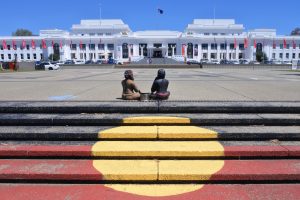Last week the Australian government called for expressions of interest in Australia’s first-ever ambassador for First Nations People to head a new Office of First Nations Engagement. This fulfills an election commitment by the Labor Party to pursue a First Nations Foreign Policy. The call for applications gives an idea of how the new government intends to fulfill its commitment to incorporate First Nations identities, perspectives, and practices into Australia’s diplomacy.
The announcement of a First Nations Foreign Policy during the election campaign was a development that surprised some, but it should be seen as the culmination of a long process involving decades of groundwork.
The Department of Foreign Affairs and Trade (DFAT) since 2004 has had an Indigenous Recruitment and Career Development Strategy including targeted recruitment, trainee and graduate pathways, and workplace support. This has helped build the careers of a cadre of Indigenous diplomats including Australia’s first Indigenous ambassador, Damien Miller, and first senior executive, Julie-Anne Guivarra. There are specific “identified positions” where Indigenous cultural knowledge will be an advantage, recognizing what the world’s oldest continuing civilization offers Australia’s diplomacy.
Early last year, DFAT also launched the Indigenous Diplomacy Agenda, which aims to use global forums to shape international norms around the rights of Indigenous peoples, promote Indigenous businesses, and ensure that Australia’s development program benefits Indigenous peoples. Indigenous diplomats represent Australia at key international forums such as the United Nations Permanent Forum on Indigenous Issues.
Recently advocates have sought to expand this further. In April 2022, Charles Darwin University held a forum with Labor’s then-shadow ministers on how to better incorporate First Nations perspectives into foreign policy. According to Deputy Vice Chancellor First Nations Leadership Reuben Bolt, “First Nations people have thousands of years of diplomatic practice in Australia, and their ideas, views, and voices must be a part of this conversation to help shape the overall direction for our country.”
Prior to Australia’s May election, the Australian Feminist Foreign Policy Coalition released a paper by James Blackwell and Julie Ballangarry that set out what an Indigenous Foreign Policy might involve. They focus on the “potential First Nations peoples and approaches can bring to our representation on the world stage,” including First Nations worldviews and cosmologies around “collective but individual responsibilities on law, caring for Country, relationality and reciprocity.” They call for involvement and input, so that foreign policy is not “done to First Nations but with them.”
The government’s call for expressions of interest for an ambassador of First Nations People suggests these ideas have been taken on board.
First, it makes clear there will be a strong focus on engaging with First Nations communities, in what in diplomatic terms would be called “domestic public diplomacy.” According to Minister for Indigenous Australians Linda Burney, “Appointing an Ambassador for First Nations People is an opportunity to ensure the unique perspectives of Aboriginal and Torres Strait Islander peoples are included in our international engagements.” Senator Patrick Dodson describes it as “the first time Australia will have a dedicated level of First Nations representation to inform the way we engage with the world.”
This gives a clear roadmap. Instead of having to determine what a First Nations Foreign Policy is and how to apply this across Australia’s foreign policy, the new ambassador’s initial focus will be on outreach across Australia’s Indigenous communities and connecting them internationally.
Second, there is an explicit link with Australia’s current process of constitutional recognition, which aims to implement the Uluru Statement from the Heart by enshrining a voice to Parliament to advise on law and policies that affect Indigenous people. With the upcoming voice referendum the main focus of Indigenous campaign efforts, a First Nations Foreign Policy could have been seen as a distraction, but instead it has been framed as dovetailing with the Uluru Statement by engaging with likeminded countries. Last week, Dodson, who is also the special envoy for the Uluru Statement, accompanied the foreign minister to the U.N. General Assembly, holding a series of high-level meetings promoting the Uluru process.
Third, there’s a sense that adopting a First Nations Foreign Policy will be an ongoing process. Minister for Foreign Affairs Penny Wong describes the role as working to “embed Indigenous perspectives, experiences and interests into our foreign policy” – something that sounds like an agenda for “doing the work” rather than presuming ownership of all knowledge in this space. How it develops will be informed by greater engagement with Indigenous communities and also by learning from other countries. During the U.N. visit, a meeting was held with New Zealand and Canadian counterparts to learn from their experience, following on from earlier sharing.
The ongoing time frame gives space to ensure that the process is led by Indigenous people, as it needs to be. With very low First Nations representation in the traditional foreign policy space, it will take time to build agency for First Nations people to lead the discussions. Writing as non-Indigenous Australians, we see our role as sharing data and information to help support this, as well as to endorse the view that Indigenous perspectives have been an under-utilized resource in Australia’s foreign diplomacy and policymaking.
One result of the establishment of an Office of First Nations Engagement may be greater recognition of Indigenous skills and talent, helping to forefront the value of Indigenous cultural knowledge in the conduct of Australia’s diplomacy.
This is particularly important in Pacific engagement. Recent consultations by the Asia-Pacific Development, Diplomacy & Defence Dialogue (AP4D) showed real interest from Pacific communities that want to build links with Indigenous Australia. But First Nations connections can also help strengthen many relationships, including Australia’s ties with India, New Zealand, Canada, Taiwan, and Latin America, a region where Australia’s engagement is underdeveloped.
Australia’s foreign policy will be stronger the more it represents itself as a nation, and with the creation of an ambassador for First Nations People Australia is establishing a significant new diplomatic asset.

































